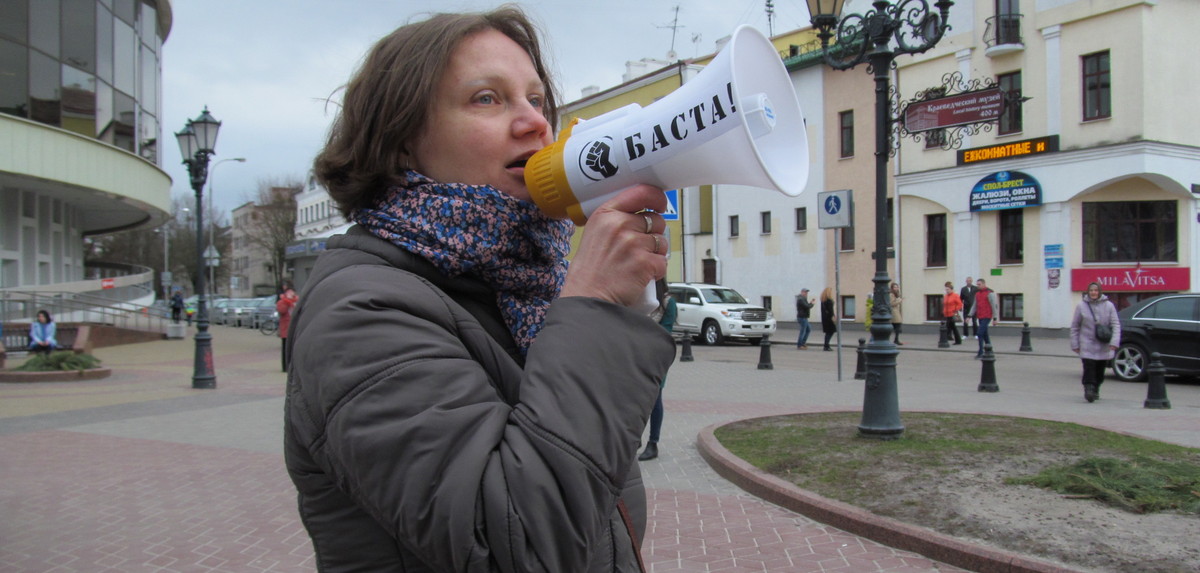Palina Sharenda-Panasiuk is political prisoner
Joint statement by the Belarusian human rights community on the sentencing of Palina Sharenda-Panasiuk
Minsk – June 9, 2021
On June 9, Palina Sharenda-Panasiuk, an opposition activist in Brest, was sentenced to two years in prison under Articles 364, 368, and 369 of the Criminal Code for using violence against police officers and insulting them, as well as for insulting the president.
We, representatives of the human rights community of Belarus, reaffirming our repeated demands to decriminalize defamation and refrain from imprisoning individuals for insulting officials, the state, government bodies and symbols (joint statement of December 22, 2020), consider the persecution and imprisonment of Palina Sharenda-Panasiuk under Art. 368 and 369 of the Criminal Code to be politically motivated, as they are linked with the peaceful exercise of freedom of expression.
Assessing the convict’s actions, which were manifested, according to the charge, by hitting an OMON officer, which did not entail bodily harm, and ripping off the mask from a police officer, which caused a scratch on his face, we note the following:
The inviolability of the home and other legal possessions of citizens is guaranteed by the Constitution. No one has the right, without a legal basis, to enter the home and other legal possession of a citizen against their will.
In accordance with Art. 17 of the International Covenant on Civil and Political Rights, no one may be subjected to arbitrary or unlawful interference with his personal and family life, arbitrary or unlawful attacks on the inviolability of his home. Everyone has the right to be protected by the law from such interference or such encroachments.
In its General Comment No. 16 “Article 17 (Right to Privacy)”, the UN Human Rights Committee notes that article 17 of the Covenant deals with protection from both unlawful and arbitrary interference. This means that it is the legislation of the state, in the first place, that should secure the protection of the right enshrined in this article. The term “unlawful” means that no interference can take place except in cases envisaged by the law. Interference authorized by States can only take place on the basis of law, which itself must comply with the provisions, aims and objectives of the Covenant. The expression “arbitrary interference” is also relevant to the protection of the right provided for in article 17. In the Committee’s view the expression “arbitrary interference” can also extend to interference provided for under the law. The introduction of the concept of arbitrariness is intended to guarantee that even interference provided for by law should be in accordance with the provisions, aims and objectives of the Covenant and should be, in any event, reasonable in the particular circumstances.
The violation of the inviolability of Palina Sharenda-Panasiuk’s home was arbitrary, as it was justified by the unacceptable goal in a democratic society of persecuting citizens for the peaceful expression of their opinions, and can be regarded as a socially dangerous act.
In accordance with the Criminal Code, every citizen has the right to protection from socially dangerous encroachment. This right belongs to a person regardless of the possibility of avoiding encroachment or seeking help from other persons or authorities.
An action committed in a state of necessary defense, that is, in accordance with the Criminal Code, while protecting not only the life and health, but also the rights of the defender or another person, the interests of society or the state from a socially dangerous encroachment by causing harm to the encroaching, is not a crime, if this was not allowed to exceed the limits of necessary defense. The harm caused, a careless scratch on the police officer’s face, obviously does not go beyond such limits and is proportionate to the victim’s violated right.
According to the Guidelines on the Definition of Political Prisoners, a political prisoner is also a person who is deprived of liberty, if at least one of the following factors is present, in the presence of political motives for persecution:
b) the detention was based on falsification of evidence of the alleged offence, or imposed in the absence of the event or elements of the offence, or imposed in connection with an offence committed by another person;
In this regard, we consider the persecution and imprisonment of Palina Sharenda-Panasiuk to be politically motivated, and the convict therefore is a political prisoner, in accordance with paragraph 3.2 (b) of the Guidelines on the Definition of Political Prisoners.
We, representatives of Belarusian human rights organizations, call on the Belarusian authorities to:
- reconsider the measures and court ruling imposed on Palina Sharenda-Panasiuk, while respecting the right to a fair trial and eliminating the factors that affected the sentence, and to release her, while selecting other measures to ensure appearance in court;
- immediately release all political prisoners and end political repression in the country.
Legal Initiative
Center for Legal Transformation “Lawtrend”
Belarusian Documentation Center
FORB Initiative
Barys Zvozskau Belarusian Human Rights House
PEN Belarus
Human Rights Center "Viasna"


















